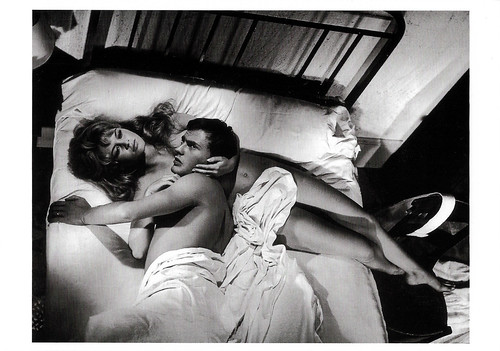
Swiss postcard by News Productions, Baulmes / CVB Publishers, Grandson, no. 56783 Photo: Collection Cinémathèque Suisse, Lausanne. Jean-Louis Trintignant and Brigitte Bardot in Et Dieu... créa la femme/And God Created Woman (Roger Vadim, 1956).

East-German postcard by VEB Progress Film-Vertrieb, Berlin, no. 17/71, 1971. Retail price: 0,20 M.
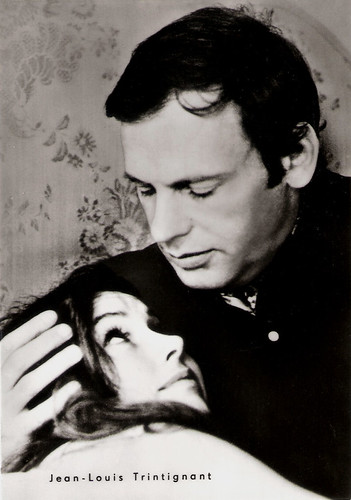
East-German postcard by VEB Progress Film-Vertrieb, Berlin, no. 72/72. Jean-Louis Trintignant and Christine Lelouch in Le Voyou/The Crook (Claude Lelouch, 1970).
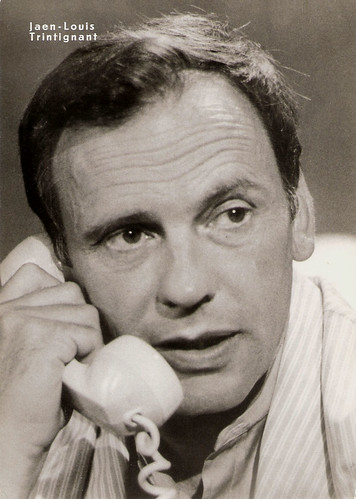
East-German postcard by VEB Progress Film-Vertrieb, Berlin, no. 73/78, 1978. Retail price: 0,20 M. Photo: Progress.
A brief affair with BB
Jean-Louis Trintignant was born in Piolenc in the southeast of France in 1930. He was born into a wealthy family. His parents were Claire (née Tourtin) and Raoul Trintignant, an industrialist.
His uncle was a race car driver, Louis Trintignant, who was killed in 1933 while practising on the Péronne racetrack in Picardie. Another uncle, Maurice Trintignant, was a Formula One driver who twice won the Monaco Grand Prix as well as the Le Mans.
Jean-Louis studied law in Aix-en-Provence, but at the age of 19, he found a sudden passion for acting, having seen Charles Dullin's stage production of Molière's 'L'Avare'. The following year, he moved to Paris to study drama at L'IDHEC (Institut des hautes études cinématographiques, now La Fémis). He made his theatrical debut in 1951 and toured in the early 1950s in several theatre productions.
His first film appearance was in La Loi des rues/Law of the Streets (Ralph Habib, 1956) and he was given his first bigger part in Si tous les gars du monde/If All the Guys in the World... (Christian Jaque, 1956), a hymn to brotherhood, solidarity and responsibility.
At the time, Trintignant was not regarded as very talented, but everything changed when Roger Vadim discovered him. He gave him the leading man role opposite Brigitte Bardot in Et Dieu... créa la femme/And God Created Woman (Roger Vadim, 1956).
Et Dieu... créa la femme gained him instant stardom. When the press stalked him because of a brief affair with Bardot, he fled into the army. His acting was interrupted for several years by mandatory military service. He served in the Algerian War and was profoundly affected by what he experienced during the conflict. After three years of military life, he returned to Paris.
Trintignant had made up his mind to give up acting, but an offer to star as Hamlet in Paris changed his mind. Critical acclaim lead to another important film role for Vadim in an updated version of Les liaisons dangereuses/Dangerous Liaisons (Roger Vadim, 1959) starring Jeanne Moreau. However, it took some time before he had another big success in the cinema.

French postcard by Editions du Globe (E.D.U.G.), Paris, no. 608. Photo: Sam Lévin.

Spanish postcard by Oscarcolor, no. 293.

Vintage press photo. Jean-Louis Trintignant and Jacqueline Sassard in Estate violenta/Violent Summer (Valerio Zurlini, 1959).
Art-house classic
Raised in and around automobile racing, Jean-Louis Trintignant was the natural choice for film director Claude Lelouch for the starring role of the race car driver in his film Un homme et une femme/A Man and A Woman (Claude Lelouch, 1966). And indeed he was perfectly cast as the widowed driver who learns to love again.
Trintignant was good friends with actress Anouk Aimée. He recommended her to Lelouch for the female lead in the film. Un homme et une femme won the Palme d’Or at the Cannes Film Festival and became a huge global success. At the time, Un homme et une femme was the most successful French film ever screened in the foreign market, and the film made Trintignant an international star.
In Italy, where he was always dubbed into Italian, he collaborated with renowned Italian directors. In Dino Risi's cult comedy Il sorpasso/The Easy Life (1962), he played a shy law student taken for a drive through the Roman and Tuscany countries by capricious, exuberant Vittorio Gassman in the summer of 1962.
Other major Italian directors he worked with were Valerio Zurlini in Estate violente/Violent Summer (1959) with Eleonora Rossi-Drago, and Il deserto dei tartari/The Desert of the Tartars (1974), Bernardo Bertolucci in Il conformista/The Conformist (1970), and Ettore Scola in La terrazzo/The Terrace (1980) and Passione d'amore/Passion For Love (1981).
In 1968, he won the Silver Bear Best Actor award at the Berlin International Film Festival for L'homme qui ment/The Man Who Lies (Alain Robbe-Grillet, 1968).
Other interesting French films of the 1960s were the sexually charged Les Biches/Bad Girls (Claude Chabrol, 1968) with Stéphane Audran, the political thriller Z (Costa-Gravas, 1969) as an idealistic young lawyer opposite Yves Montand, and the Oscar nominated morality tale Ma nuit chez Maud/My Night at Maud’s (Eric Rohmer, 1969) with Francoise Fabian.

Czech collectors card by Pressfoto, Prague, no. S 144/5 669. Jeanne Moreau and Jean-Louis Trintignant in Mata Hari, agent H21/Secret Agent FX18 (Jean-Louis Richard, 1964).
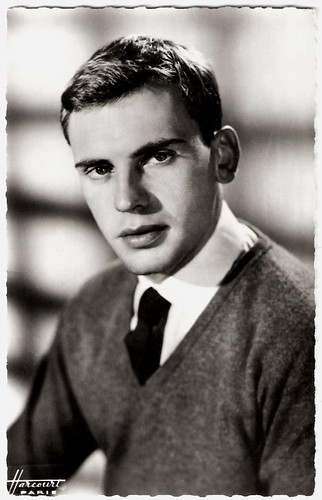
French postcard by Editions du Globe, Paris, no. 577. Photo: Studio Harcourt.

French postcard by Edition P.I., Paris, no. 1129. Photo: J.L. Castelli.

Romanian postcard by Casa Filmului Acin, no. 19. Jean-Louis Trintignant and Ewa Aulin in La morte ha fatto l'uovo/Death Laid an Egg (Giulio Questi, 1968).
Manslaughter
Jean-Louis Trintignant became particularly associated with the (political) thriller, an increasingly popular genre in France and the kind of film that seemed to fit the actor's cool but sensitive persona perfectly. Teaming up again with Lelouch, Trintignant portrayed a nihilistic but debonair professional thief in Le Voyou/The Crook (Claude Lelouch, 1970), then crossed over to the other side of the law to play a detective in Sans mobile apparent/Without Apparent Motive (Claude Lelouch, 1971).
Next, he was a French fugitive in Canada who gets involved in a kidnap plot in La course du lièvre à travers les champs/…and Hope to Die (René Clément, 1972), and a French assassin in Los Angeles in Un homme est mort/A Man is Dead (Jacques Deray, 1972).
He appeared in sixteen films in just three years between 1975 and 1977, including in Flic Story/Cop Story (Jacques Deray, 1975) as a cold-blooded murderer opposite Alain Delon. In 1978, he won acclaim as a bank employee standing up against corruption in the César-winning L’Argent des autres/Dirty Money (Christian de Chalonge, 1978) with Catherine Deneuve.
After several undistinguished features, he made his first English language feature film, Under Fire (Roger Spottiswoode, 1983) starring Nick Nolte. Following this, he starred in François Truffaut's final film, Vivement dimanche!/Confidentially Yours (1983) opposite Fanny Ardant.
In 1994, he appeared in Krzysztof Kieślowski's last film, Trois couleurs: Rouge/Three Colors: Red opposite Irène Jacob. He played a disillusioned retired judge who spies on his neighbours while grappling with his own inner moral dilemmas. He lent his voice to the widely acclaimed La cité des enfants perdus/City of Lost Children (Marc Caro, Jean-Pierre Jeunet, 1995). This was followed by his role as the older version of Mathieu Kassovitz’s character in the acclaimed Un Héros très discreet/A Self-Made Hero (Jacques Audiard, 1996).
Trintignant has won several awards, including a Silver Bear at the Berlinale for Best Actor for L'Homme qui ment (1968), the Cannes Award for Best Actor for Z (1969) and a special David di Donatello in Italy in 1972. He was nominated for the César five times: in 1987, 1995, 1996, 1999 and 2013.

Romanian postcard by Casa Filmului Acin.

Russian postcard, no. 109/75, 1975. Jean-Louis Trintignant and Nadine Trintignant, Moscow, 1967.

Romanian postcard by Casa Filmului Acin, no. 43 072. Photo: publicity still for Le bon plaisir (Francis Girod, 1984) with Catherine Deneuve.

Romanian postcard by Casa Filmului Acin, no. 189.
Amour
Jean-Louis Trintignant has been married twice. His first wife was actress Stéphane Audran. The marriage was short-lived and the actress left him to marry director Claude Chabrol. His second wife, Nadine Trintignant-Marquand, was also an actress as well as a screenwriter and director. They had three children: Vincent Trintignant, Pauline (who died of crib death in 1969) and Marie Trintignant. The couple later divorced and Trintignant subsequently married the famous racing driver Marianne Hoepfner in 1984. They remained together till his death.
At the age of 17, his daughter Marie performed in La terrazza alongside her father and later became a successful actress in her own right. In 2003, she was killed by her boyfriend, Bertrand Cantat, the lead rock singer and guitarist of the group Noir Désir, in a hotel room in Vilnius, Lithuania. She was 41.
Apparently the jealous Cantat became outraged when Trintignant received a telephone call from her husband, director/actor Samuel Benchetrit. She suffered a cerebral edema as a result of her skull fractures and died four days after the incident. In 2004, Cantat was sentenced to eight years in prison for manslaughter, which was initially appealed by Marie's family, who wished for a heavier sentence. They later cancelled their appeal and the judgment was final.
Since 1996, Jean-Louis Trintignant essentially focused on his stage work. After a 14 year gap, he returned to the cinema in grand style. In Amour/Love (Michael Haneke, 2012), he played the male lead opposite Emmanuelle Riva and Isabelle Huppert.
Trintignant had already worked with director Michael Haneke, when he provided the voice of the Narrator (The School Teacher as an Old Man) in the French edition of Das weiße Band - Eine deutsche Kindergeschichte/The White Ribbon (Michael Haneke, 2009).
Haneke had sent Trintignant the script, which had been written specifically for him. Trintignant said that he chooses which films he works in on the basis of the director, and said of Haneke that "he has the most complete mastery of the cinematic discipline, from technical aspects like sound and photography to the way he handles actors". For this role, he was awarded the César 2013 and the European Film Award for Best Actor.
In 2018, Trintignant announced that he was diagnosed with prostate cancer and would not be seeking treatment.[ In November 2021, it was reported that he was gradually losing his sight and was in declining health. In 2018 Trintignant announced his retirement from cinema, but in 2019 he accepted a role in Claude Lelouch's film Les plus belles annees d'une vie/The Best Years of a Life (Claude Lelouch, 2019), a follow-up to Un homme et une femme and its sequel Un homme et une femme, 20 ans dejà.
James Travers at French Film Guide: "A quiet and unassuming man by nature, Trintignant remains modest about his achievements and has not actively sought stardom. Few French actors are as universally well-regarded as he is and he is unquestionably one of the most charming and talented actors of his generation." In 2021 he again accepted a role in a new film by Lelouch, L'amour c'est mieux que la vie, which has not yet been released.

Russian postcard, no. 3K-2137.
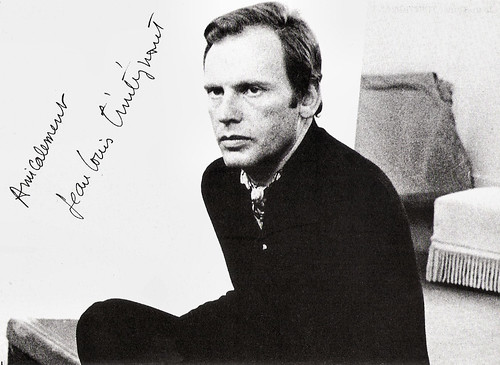
French postcard by La Roue Tourne, Paris.
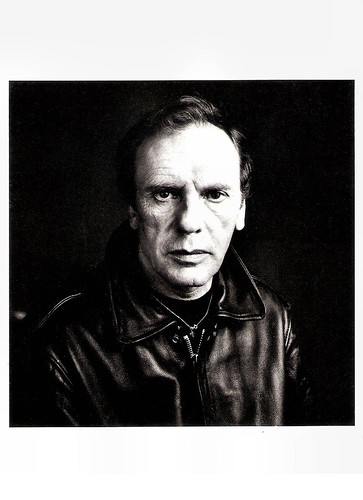
Swiss postcard by Musée de l'Elysée, Lausanne / News Productions, Baulmes. Photo: Laurence Sudre.
American trailer for Et Dieu... créa la femme/And God Created Woman (1956). Source: TheCultBox (YouTube).
Trailer for Trois couleurs: Rouge/Three Colors: Red (1994). Source: Danios12345 (YouTube).
Trailer for Amour/Love (2012). Source: @Hollywood (YouTube).
Sources: James Travers (French Films), Tom Zoerner (IMDb), New Wave Film.com, Wikipedia and IMDb.
1 comment:
A wonderful talent, yet not as well known in America as he deserved. He stars in 4 of my favorite films: The Conformist, A Man and a Woman, Red and Amour.
Post a Comment